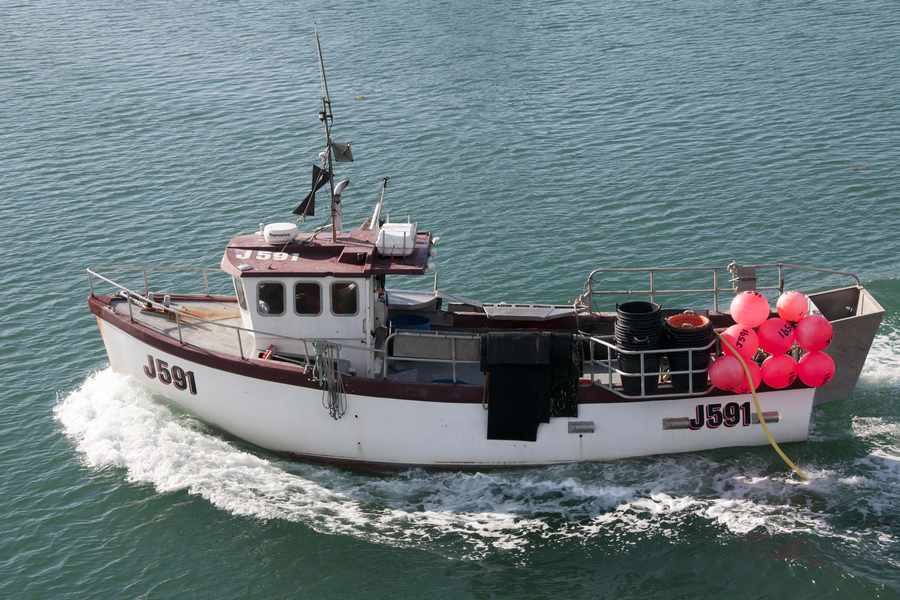Don Thompson said that although some young fishing crews had faced financial ruin following the winter storms of 2013-14, nearly a year after the aid was announced, only one fisherman has had to leave the industry.
Mr Thompson said that the bail-out ‘gave a clear signal that the government does actually care about the industry’, but added that the States still needed to ensure that Jersey had more autonomy over EU fishing quotas.
As part of the financial package, the States paid half of the 2014 mooring fees for the fleet – the price of which is dependent on the length of the vessel. The States also paid the Jersey Fishermen’s Association’s annual fee to the Marine Stewardship Council audit – about 2,500 euros – for this year and last.
Fishermen could also apply for a grant to cover 80 per cent of the cost of replacing lobster pots and 20 per cent of the cost of repairing them.
Mr Thompson said that about 30 fishermen qualified for support for loss of equipment and that in total about £105,000 was given to the fleet.
Taken any decent fishing photographs recently?
Upload them to the Your Jersey section of our website here
He said: ‘The fishermen who are well established can weather the storm, but we’ve got a good number of young ones coming through the system and moving onto their first boats. We did not want to lose them. We try to avoid getting any financial assistance from our government. We’ve never been an industry that have gone for a bit of dosh, but it was clear last winter that if we didn’t seek some support, we would lose some fishermen.’
Mr Thompson said that the livelihoods of six young fishermen had hung in the balance. ‘That doesn’t sound like a lot, but if you took six businesses out of the middle of St Helier, that would have a huge impact.
‘Fishermen are really difficult to replace. It is not a career that you can just wake up and decide to pursue. It takes a lifetime’s commitment. We had to make sure that we did not lose the next generation.’
Mr Thompson added that Jersey fishermen were still concerned about EU regulations, which dictate their fishing quotas. ‘Fishermen in, say, France and Holland receive regulation and restrictions from Brussels in terms of quota, but they also get the benefits,’ he said.
‘About £350 million has been given by the EU in support of science projects, infrastructure, equipment on boats and modernisation, which they are eligible for. We are totally excluded from any of that support yet we have the same restrictions.’

Why were Jersey fishermen offered a States bail-out?
Some crews were left on the brink of financial ruin following the 2013/2014 winter storms.
The fleet of boats was left moored in the Harbour for almost all the festive period, which is usually the most lucrative time of the year for fishermen and not only were the fishermen unable to earn a living, but hundreds of their lobster pots were lost or seriously damaged by the rough seas.
Last year Don Thompson, president of the Jersey Fishermen’s Association, warned that young fishermen could be forced out of the business after suffering a massive loss of income.
Speaking to the JEP in February last year, he said: ‘The bottom line is that for established fishermen like myself it is part of life and you just have to weather it. ‘But we have a number of young guys who have their first boat. They may have taken out large bank loans to buy their small boats and be desperate for an income. They may or may not survive this.’
He explained that the industry was worth around £750,000 per month. Around 80 per cent of the lobsters, scallops and crabs go to the export market while 20 per cent remains in Jersey.
What was the bail-out?
The funding to fishermen was given by the Economic Development department.
All fleet fishermen had half of their mooring fees paid for while the Jersey Fishermen’s Association’s annual fee to the Marine Stewardship Council audit was paid for this year and last.
Fishermen could also get grants to cover 80 per cent of the cost of replacing lobster pots and 20 per cent of the cost of repairing them.






